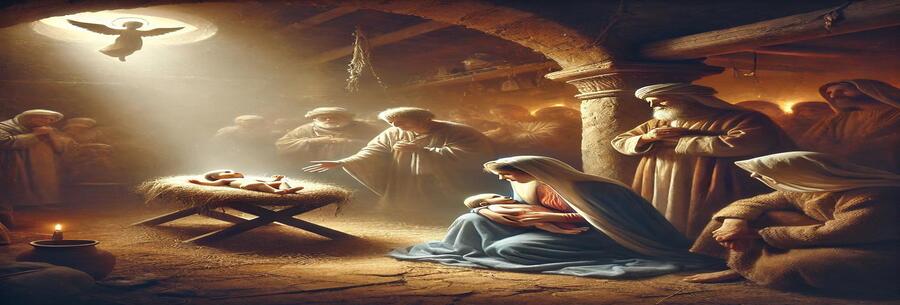The Nativity of the Virgin Mary, celebrated on 8 September, is one of the great feasts of the Christian liturgical calendar, particularly in the Catholic Church and the Orthodox Churches. This event, although it does not appear explicitly in the canonical Gospels, is drawn from ancient and apocryphal traditions, in particular the Protoevangel of James, which recounts the birth of Mary, the future mother of Jesus, and the singular role she was to play in salvation history.
Context and importance of the feast
This feast celebrates the birth of the one chosen by God to become the Mother of the Saviour. From the beginning of Christianity, Mary was seen as a key figure in the divine plan, not only for her divine motherhood, but also for her life of faith, purity and total obedience to God. Her birth is therefore seen as an essential stage in the plan of salvation, as it marks the beginning of a path that will lead to the Incarnation of the Son of God.
In the Catholic Church, this feast is classified as a liturgical memory, which means that it is an event of great importance in the spiritual life of the faithful. The Nativity of the Virgin is often celebrated with processions, special prayers and solemn Masses in many parts of the world, particularly in countries with a strong devotion to Mary such as Italy, Spain, France, Mexico and the Philippines.
The traditional story of Mary's Nativity
According to tradition, Mary's parents were Anne and Joachim, a pious but barren couple who lived in Jerusalem. They were elderly and desperate to have children. At the time, sterility was seen as a sign of divine disgrace, and Joachim, deeply affected, decided to isolate himself in the desert to pray and fast. Meanwhile, Anne prayed intensely to God to grant her a child.
The story goes that an angel appeared separately to Anne and Joachim to announce that they would have a daughter who would be blessed beyond all women. Filled with joy, the couple met again and shortly afterwards Anne conceived Mary. Her birth was surrounded by an atmosphere of grace and blessing, for she had been chosen by God to be the mother of Christ.
Mary was therefore considered from the outset to be predestined for an exceptional mission. The Catholic Church even teaches, through the dogma of the Immaculate Conception, that Mary was conceived without the stain of original sin, preserved from the moment of her conception in view of the unique mission she would carry out. This dogma, proclaimed in 1854 by Pope Pius IX, thus makes Mary's Nativity not only an important event but also one that carries profound theological mysteries.
The spiritual significance
In Christian tradition, Mary's birth is the first ray of the light of salvation that will culminate in the birth of Jesus. She represents the gentleness of divine providence, silently, humbly and discreetly preparing for the coming of her Son into the world. Thus, to celebrate the Nativity of the Virgin Mary is to give thanks to God for Mary's gift to humanity and for her role in redemption.
The Fathers of the Church saw in Mary's birth the dawn of a new era. Saint Augustine said that the Virgin's nativity is "the annunciation of joy to the whole world", because through her the door to salvation opens. The hymns and prayers dedicated to the Virgin on this day express this joy and gratitude: "Today begins the salvation of the world", declares a Byzantine hymn sung on 8 September.
For the faithful, the celebration of this feast is also an opportunity to meditate on Mary's virtues - her humility, faith, obedience and total openness to the divine will. By praying to Mary and celebrating her birth, Christians seek to draw closer to God through her intercession and to imitate her example.
Celebrations around the world
The Nativity of the Virgin Mary is celebrated with particular fervour in certain regions of the world. In France, it is celebrated under the name of "Notre-Dame de la Nativité". In some localities, processions are organised to honour the Virgin, and entire villages gather for religious festivities.
In the Orthodox Church, the Nativity of the Virgin is also a major festival, known as the "Little Easter of Summer" because of the joy it brings to the faithful. Icons depicting Mary's birth often show Anne, her mother, surrounded by maids who witness the birth of the blessed child.
On 8 September, the feast of the Nativity of the Virgin Mary is much more than a simple commemoration of a historical or traditional event. It is a call to acknowledge Mary's central role in salvation history and a reminder of God's discreet and benevolent action in the lives of his faithful. It is a celebration of the purity, humility and unconditional love of God, incarnate in the person of Mary.




















